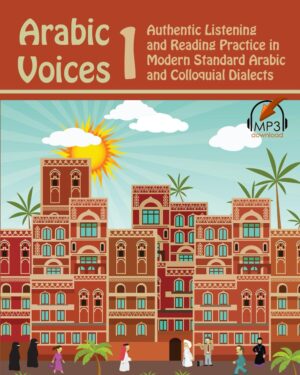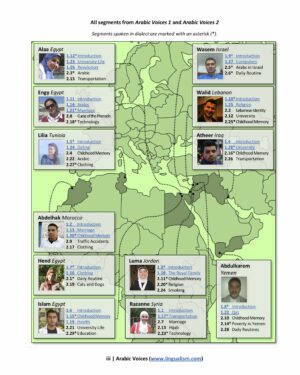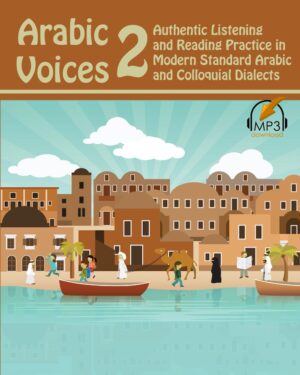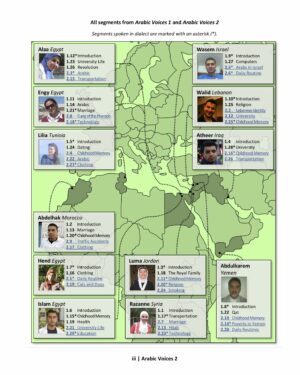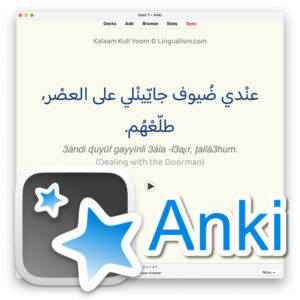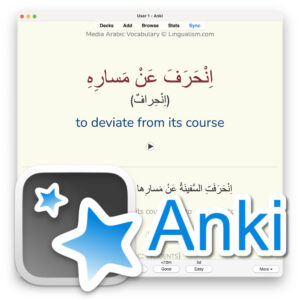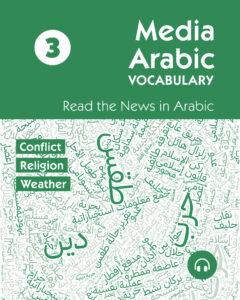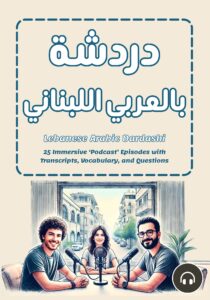Home » Modern Standard Arabic » University–Walid
University–Walid
| Peace, mercy and blessings of God, [00:00.2] | السلام عليكم ورحمة الله وبركاته، | |
| Hello and welcome to a new Arabic Voices video. [00:03.0] | أهلًا ومرحبًا بكم في فيديو جديد من فيديوهات Arabic Voices. | |
| Today we will talk about what Walid said about university life in Lebanon, and we will comment on the different words and terms he used. [00:07.9] | اليوم سنتحدّث عمّا قاله وليد بشأن الحياة الجامعية في لبنان، وسنعلّق على ما استخدمه من كلماتٍ ومصطلحاتٍ مختلفة. | |
| So let's start on page 67, specifically on line 4, where Walid says, "The Arabic language, for example, is the mother tongue in public universities, i.e. Lebanese universities." [00:18.0] | فهيّا بنا نبدأ في الصفحة السابعة والستون، وتحديدًا في السطر الرابع، حيث يقول وليد: (فاللغة العربية مثلًا هي اللغة الأم في الجامعات الحكومية، أي الجامعات اللبنانية). | |
| Walid here uses the word أي (that is, i.e.," to explain or clarify what he said before, which is that public universities are the Lebanese… Lebanese universities. [00:33.8] | يستخدم وليد هنا كلمة [أي]، ليشرح أو ليوضح ما قاله من قبل، وهو أن الجامعات الحكومية هي الجامعات اللبناني… اللبنانية. | |
| You can use أي (any) when explaining something you've already mentioned. For example, you could say, "I prefer the story... I prefer reading fiction, [00:46.4] | يمكنك استخدام [أي] عند توضيح أمرٍ ما كنت قد ذكرته من قبل، فيمكنك مثلًا أن تقول: (أنا أفضل القصة… أنا أفضل قراءة القصص الخيالية، | |
| That is, novels, stories, and fantasy novels," and thus, you explain what I said by saying أي. [01:00.3] | أي الروايات والقصص وروايات الفانتازيا)، وهكذا، فأنت تشرح ماقلته بقولك [أي]. | |
| Non-state universities, that is, private universities," and so, you can use أي to explain and clarify. [01:11.1] | (الجامعات الغير حكومية، أي الجامعات الخاصة)، وهكذا، يمكنك استخدام [أي] للشرح والتوضيح. | |
| We then move to line 6, where Walid says, "As for private universities, the situation is somewhat different." The situation is somewhat different, meaning that the situation is somewhat different. [01:22.8] | ننتقل بعد ذلك إلى السطر السادس، حيث يقول وليد: (أما في الجامعات الخاصة فالوضع يختلف بعض الشيء)، الوضع يختلف بعض الشيء، أي أن الوضع يختلف إلى حدٍ ما. | |
| You can say: ختلف بعض الشيء (a little different) or يختلف إلى حدٍ ما (somewhat different), it's not quite different, but it's a little different, somewhat different. [01:38.8] | يمكنك أن تقول: [يختلف بعض الشيء] أو [يختلف إلى حدٍ ما]، فليس مختلف تمامًا، ولكنه يختلف بعض الشيء، يختلف إلى حدٍ ما. | |
| You can say, "I disagree with the writer's opinion somewhat" or "I disagree with the writer's opinion somewhat" both have the same meaning. [01:48.5] | يمكنك أن تقول: (أنا أختلف مع رأي الكاتب بعض الشيء) أو (أنا أختلف مع رأي الكاتب إلى حدٍ ما) كلاهما بمعنّا واحد. | |
| We then move to line 7, where Walid says, "In some private universities, the Arabic language is the second language, and the first language is French or English...and English." [01:59.5] | ننتقل بعد ذلك إلى السطر السابع، حيث يقول وليد: (ففي بعض الجامعات الخاصة تكون اللغة العربية فيها اللغة الثانية، واللغة الأولى هي الفرنسية أو الإنجل… والإنجليزية). | |
| We comment here on the use of the word بعض (some), بعض الجامعات الخاصة (some private universities). Of course you know the meaning of the word بعض, but we would like to point out here that the word بعض is always recited by… the word of knowledge, that is, it precedes the word that follows the word بعض الـ. [02:14.5] | ونعلّق هنا على استخدام كلمة [بعض]، (بعض الجامعات الخاصة) بالطبع أنت تعرف معنى كلمة [بعض]، ولكن نوّد الإشارة هنا إلى أن كلمة [بعض] دائمًا ما تُتلى بال… كلمة معرفة، أي تسبق الكلمة التي تلي كلمة [بعض] [الألف واللام]. | |
| She says, "Some universities, some books, some libraries," and so on, بعض العلوم (some sciences) the word that follows the word بعض must be defined, "I read some books," so the word that follows the word بعض and its beginning must be defined with the definite article. [02:36.3] | تقول: (بعض الجامعات، بعض الكتب، بعض المكتبات)، وهكذا، (بعض العلوم) فلابدّ من تعريف الكلمة التي تلي كلمة [بعض]، (أنا أقرأ بعض الكتب) فلابدّ من تعريف الكلمة التي تلي كلمة [بعض] وبدايتها [بالألف واللام]. | |
| Great! We then move to line 12, where Walid says, "As for the international reputation, the Lebanese universities have a reputation that is more than excellent worldwide." [02:58.5] | عظيم! ننتقل بعد ذلك إلى السطر الثاني عشر، حيث يقول وليد: (أما من ناحية الشهرة العالمية فالجامعات اللبنانية ذات سمعة أكثر من ممتازة عالميًا). | |
| We start first with the word ناحية (area), and when you're talking about different things about something, you can say which side you're talking about, you can say 'on the one hand' or 'from the side.' [03:11.8] | نبدأ أولًا بكلمة [ناحية]، وعندما تتحدّث عن أمور مختلفة خاصة بشيءٍ ما، يمكنك أن تحدد أي جانب تتحدّث عنه، فيمكنك أن تقول [من ناحية] أو [من جانب]. | |
| You can say, "In terms of world fame, in terms of fame," and you can use the word ناحية (in terms of), to talk about different aspects of something. [03:25.6] | يمكنك أن تقول: (أما من ناحية الشهرة العالمية، أما من جانب الشهرة)، ويمكنك أن تستخدم كلمة [ناحية]، للحديث عن جوانب مختلفة بشأن أمرٍ ما. | |
| For example, you can say, "Culturally, this country is great, historically this country is ancient, literary this book is excellent," and so on, the word من ناحية means from a certain aspect. [03:40.1] | فيمكنك أن تقول مثلًا: (من الناحية الثقافية هذا البلد عظيم، من الناحية التاريخية هذا البلد عريق، من الناحية الأدبية هذا الكتاب ممتاز)، وهكذا، فكلمة [من ناحية] أي من جانب معين. | |
| After that, on the same line, Walid says, "Lebanese universities have a reputation that is more than excellent worldwide." [03:56.8] | بعد ذلك في نفس السطر يقول وليد: (فالجامعات اللبنانية ذات سمعة أكثر من ممتازة عالميًا). | |
| We would just like to mention here what we had previously explained by the word ذات or ذا, which means possession or any عنده or عندها. "Lebanese universities have a reputation more than excellent globally." [04:06.1] | فقط نودّ التذكير هنا بما كنا قد شرحناه من قبل كلمة [ذات] أو [ذا]، أي تعني الامتلاك أو أي [عنده] أو [عندها]، (فالجامعات اللبنانية عندها سمعة أكثر من ممتازة عالميًا)، | |
| That is, with a reputation that is more than excellent globally, and we've explained that before, but we just wanted to quickly review what we've explained. [04:22.5] | أي ذات سمعة أكثر من ممتازة عالميًا، وكنا قد شرحنا ذلك من قبل، ولكن وددنا فقط المراجعة سريعًا على ما كنا قد شرحناه. | |
| After that, on line 14, Walid says, "And others seek to conclude exchange contracts, exchanging students with Lebanese universities." [04:31.5] | بعد ذلك في السطر الرابع عشر—يقول وليد: (والبعض الآخر يسعى لإبرام عقود مبادلة، مبادلة الطلبة مع الجامعات اللبنانية). | |
| With the use of the verb يسعى (to seek), as Walid used it here, you can use لـ or use the preposition إلى. [04:44.2] | ويمكنك مع استخدام الفعل [يسعى]، كما استخدمه وليد هنا أن تستخدم [اللام] أو تستخدم حرف [ إلى]. | |
| You can say, "others seek to conclude exchange contracts," or "seeking to conclude exchange contracts." [04:55.2] | فيمكنك أن تقول: (البعض الآخر يسعى إلى إبرام عقود مبادلة)، أو (يسعى لإبرام عقود مبادلة)، | |
| You can use the preposition لـ or إلى, both are correct, "he is seeking to travel" or "he is seeking to travel," both are correct. [05:03.4] | يمكنك استخدام حرف [ اللام] أو [إلى]، كلاهما صحيح، (هو يسعى إلى السفر) أو (هو يسعى للسفر)، كلاهما صحيح. | |
| Then we move to line 18, Walid says, "such as drugs and excessive alcohol, where seminars and public awareness lectures are held." [05:12.2] | ننتقل بعد ذلك إلى السطر الثامن عشر—ويقول وليد: (كالمخدرات والإفراط في الكحول، حيث تُقام الندوات ومحاضرات للتوعية العامة). | |
| And the word تُقام (to be held) or the verb يُقام we often use with the word محاضرة أو ندوة (lecture or seminar), "a lecture is held every week, or a seminar is held every week." [05:25.1] | وكلمة [تُقام] أو الفعل [يُقام] غالبًا ما نستخدمه مع كلمة [محاضرة أو ندوة]، (تُقام محاضرة كل أسبوع، أو تُقام ندوة كل أسبوع). | |
| You can also use the verb and say, "holding seminars, holding lectures" or "holding seminars, holding lectures." Both are correct. يُقام or يُعقد her words are correct, and we often use these two. The two verbs with the word ندوة and the word محاضرة. [05:34.5] | يمكنك كذلك أن تستخدم الفعل [تُعقد] أو [يُعقد]، يمكنك أن تقول: (عقد الندوات، عقد المحاضرات) أو (إقامة الندوات، إقامة المحاضرات)، كلاهما صحيح، [يُقام] أو [يُعقد] كلامها صحيح، وغالبًا ما نستخدم هذين الفعلين مع كلمة [ندوة] وكلمة [محاضرة]. | |
| Great! We then move to line 22, where Walid says, "As for my own experience in Lebanese universities, I can almost say that it is one of the best stages of my life." [05:56.7] | عظيم! ننتقل بعد ذلك إلى السطر الثاني والعشرون، حيث يقول وليد: (أما عن تجربتي الخاصة في الجامعات اللبنانية، فأكاد أُجزم أنها من أفضل مراحل حياتي). | |
| Here we would like to quickly refer to what we have already mentioned. [06:09.8] | وهنا نودّ الإشارة سريعًا إلى ما كنا قد ذكرناه من قبل. | |
| First with regard to the meaning of the verb أُجزم "I assert." That is, I am absolutely certain. "I am certain that this is true." But here Walid may not be completely certain, but he is almost certain, meaning that he is close to certainty, meaning he is certain but not completely certain. [06:14.0] | أولًا فيما يختص بمعنى الفعل [أُجزم]، أي أنني متأكد تمام التأكد، (فأنا أُجزم بأن هذا صحيح)، ولكن هنا وليد ليس ربما متأكدًا تمام التأكد، ولكنه يكاد يُجزم أي أنه قريب من الإجزام، يعني هو متأكد ولكنه ليس على تمام التأكد. | |
| I am almost certain. "I am almost certain that this is true," meaning that I am probably ninety-nine percent sure of this. [06:38.3] | فأكاد أُجزم، (أكاد أُجزم بأن هذا الأمر صحيح)، أي أنني ربما تسع وتسعون بالمائة متأكد من هذا الأمر. | |
| We then move on to line 28, and on line 28, Walid says at the end of his speech: [06:50.2] | ننتقل بعد ذلك إلى السطر الثامن والعشرون، وفي السطر الثامن والعشرون يقول وليد في نهاية حديثه: | |
| In short, this is university life in Lebanon." And he ends his speech by saying باختصار (briefly), he summarizes what he had said before, and concludes by saying باختصار. [07:03.7] | (باختصار هذه هي الحياة الجامعية في لبنان)، ويُنهي حديثه بقوله [باختصار] فهو يلخص ما قد قاله من قبل، ويختتم بقوله بقوله [باختصار]. | |
| And you can use this a lot in the course of a conversation, or at the end of your article writing, you can say باختصار or في الخلاصة. [07:17.6] | ويمكنك استخدام هذا كثيرًا في أثناء الحديث، أو في نهاية كتاباتك للمقالات، يمكنك أن تقول [باختصار] أو [في الخلاصة]. | |
| باختصار or في الخلاصة are two different methods that you can use to end your talk, or to summarize what you said while you were speaking or while you were writing. [07:27.6] | [باختصار] أو [في الخلاصة] طريقتين مختلفتين يمكنك أن تستخدمهما لنهاية حديثك، أو لتلخيص ما كنت قد قلته أثناء حديثك أو أثناء كتابتك. | |
| You can say, "In short, I love life in Egypt." If you have explained how or why you love life in Egypt; You can say "in summary, I love life in Egypt." [07:40.3] | يمكنك أن تقول: (باختصار أنا أحب الحياة في مصر)، إن كنت قد شرحت كيف أو لماذا أنت تحب الحياة في مصر؛ يمكنك أن تقول (في الخلاصة أنا أحب الحياة في مصر)، | |
| In the end, I love life in Egypt after you explained the reasons that made you love life in Egypt, and this is just an example. [07:51.5] | أي في نهاية الأمر أحب الحياة في مصر بعد شرحك للأسباب التي جعلتك تحب الحياة في مصر وهذا فقط مثال. | |
| You can use the word باختصار or the word في الخلاصة to summarize what you have said. [08:01.6] | فيمكنك استخدام كلمة [باختصار] أو كلمة [في الخلاصة] لتلخيص ما قلته. | |
| Briefly or in summary, we have commented today on what Walid said about Lebanese life... regarding university life in Lebanon. [08:08.3] | وباختصار أو في الخلاصة نحن قد علّقنا اليوم على ما قاله وليد بشأن الحياة اللبنانية… بشأن الحياة الجامعية في لبنان. | |
| Thank you very much, and see you again in another video. [08:19.2] | أشكركم شكرًا جزيلًا، وألقاكم على خير في فيديو آخر. | |
| Peace, mercy and blessings of God. [08:23.1] | السلام عليكم ورحمة الله وبركاته. |
Video Lessons
Arabic Voices MSA Lessons
Arabic teacher Mostafa Ahmed takes us through segments in MSA from Lingualism's book Arabic Voices 1: Authentic Listening and Reading Practice in Modern Standard Arabic and Colloquial Dialects, explaining interesting points of grammar and vocabulary.

